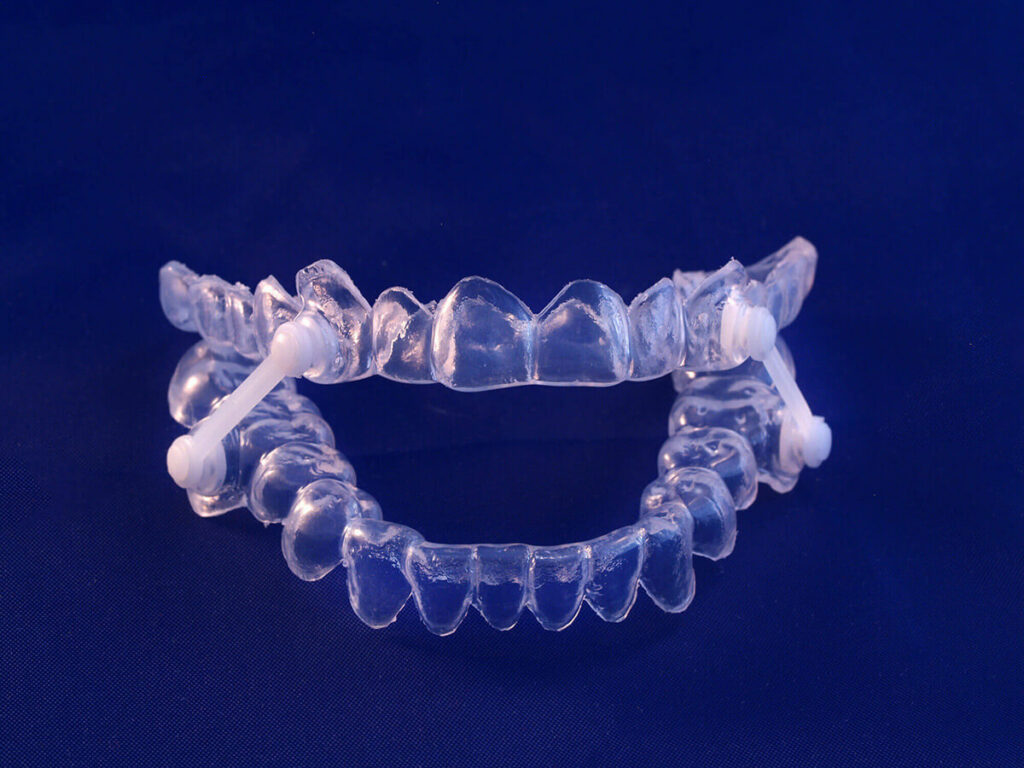Sleep Apnea
Sleep apnea is a serious condition that can lead to other health problems. We offer effective treatment options to improve your health.
Sleep Apnea Treatment in Dublin, Ohio
Sleep apnea is a condition where breathing repeatedly stops during sleep, often due to relaxed throat muscles blocking the airway—known as obstructive sleep apnea (OSA). These muscles support the soft palate, uvula, tonsils, tongue and throat walls. When they relax too much, the airway narrows, reducing airflow and oxygen levels. The brain briefly wakes the body to restore breathing, though you may not remember it.
Common signs include poor sleep, frequent sore throats, headaches and trouble feeling rested. Sleep apnea is linked to serious health risks—those with it are 23 times more likely to suffer a heart attack, and 92% of stroke victims had undiagnosed sleep disorders. At Dental Reflections Dublin, we’re trained to educate and treat sleep-related issues in a simple, cost-effective way—because your overall health matters, day and night.
Schedule an Appointment
-
What is sleep apnea?
Sleep apnea is a sleep disorder that causes repeated interruptions in breathing during sleep, leading to poor sleep quality and reduced oxygen levels in the body. Left untreated, it can contribute to serious health issues. There are three main types:
- Obstructive Sleep Apnea (OSA): The most common type, caused by overly relaxed throat muscles that block the airway during sleep.
- Central Sleep Apnea: A rarer form, occurring when the brain fails to signal the muscles that control breathing.
- Complex Sleep Apnea Syndrome (Treatment-Emergent Central Sleep Apnea): A combination of obstructive and central sleep apnea.
Key factors and symptoms to be aware of:
- Loud or intense snoring (though not always an indicator of sleep apnea)
- Risk factors include being overweight, alcohol or drug use, and genetics
- Family history increases the likelihood of developing the condition
Recognizing and treating sleep apnea is essential for long-term health and well-being.
-
How is sleep apnea diagnosed?
Sleep apnea is usually diagnosed through a sleep study, either at home or in a sleep center. The test tracks brain activity, breathing, oxygen levels, sleep stages, body position and interruptions like snoring or paused breathing.
Afterward, a specialist reviews the results to confirm a diagnosis and recommend treatment. For obstructive sleep apnea, a dentist trained in sleep medicine can provide oral appliance therapy. Our office offers consultations for patients interested in this treatment option.
-
What are the symptoms of sleep apnea?
Having one or more of these symptoms doesn’t necessarily mean you have sleep apnea—consult your doctor for an accurate diagnosis:
- Loud snoring
- Daytime sleepiness or low energy
- Frequent headaches
- Restless or poor-quality sleep
- Insomnia or waking up often
- Dry or sore throat upon waking
- Gasping or choking during the night
- Sudden mood changes
- Difficulty concentrating
- Frequent nighttime urination
-
How is sleep apnea treated?
Snoring and obstructive sleep apnea can be treated with surgery, CPAP/BiPAP machines or oral appliance therapy. Oral appliances are the least invasive option and are effective for mild to moderate OSA, helping keep the jaw in position to allow proper airflow.
Always consult your sleep physician before starting treatment. If oral appliance therapy is chosen, our team will ensure that it’s properly fitted and positioned to keep your airway open throughout the night.
Questions about sleep apnea?
If you have any questions about sleep apnea or its treatment, feel free to contact our office—we’re happy to help.

